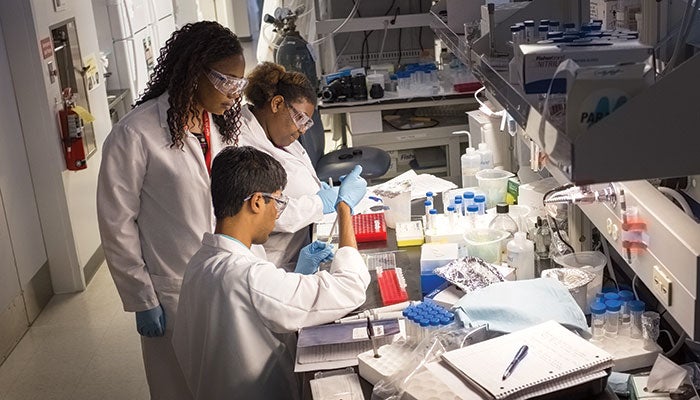
Quinetra Gathers (seated, right), a senior at Fisk University, worked in the lab of CBIS Director Deepak Vashishth conducting research on bones as part of the LSAMP undergraduate research program.
Dozens of students from universities including MIT, Boston University, Morehouse, Fisk, and Texas State, as well as undergraduates from Rensselaer, participated in cutting-edge research on campus during the last two months as part of several undergraduate research programs offered by Rensselaer.
The National Science Foundation (NSF) has stated that, “active research experience is one of the most effective techniques for attracting talented undergraduates to careers in mathematics, science, and engineering.” Rensselaer, which has a longstanding commitment to undergraduate research, offered several opportunities to outstanding undergraduates this summer.
Students conducted research in the Center for Biotechnology and Interdisciplinary Studies (CBIS) through the Louis Stokes Alliances for Minority Participation (LSAMP) program, funded by the NSF. George Makhadtadze, Constellation Professor of Biocomputation and Bioinformatics, and Blanca Barquera, associate professor of biology, served as LSAMP faculty coordinators, choosing the participants and matching them with CBIS faculty mentors.
According to Stan Dunn, dean of graduate education at Rensselaer, “the program is designed to help curious and solution-oriented underrepresented minority students gain confidence in the lab, develop enthusiasm for graduate school, cultivate a professional network, and earn attractive qualifications.”
Quinetra Gathers and all of the LSAMP program participants have the ability to shape and change the world. It is our privilege and responsibility to help them prepare to do just that.”—Deepak Vashishth
The program attracts exceptional participants such as Quinetra Gathers from North Charleston, S.C., and now a senior majoring in biology at Fisk University. She worked with Director of CBIS Deepak Vashishth, a professor of biomedical engineering who conducts breakthrough research on bones. Gathers’ research focused on finding a correlation between advanced glycation end-products, and bone propagation.

Michelle Bessiake, a junior majoring in microbiology at Texas Southern University in Houston, worked with Research Scientist Fuming Zhang in Robert Linhardt’s lab.
“Quinetra Gathers and all of the LSAMP program participants have the ability to shape and change the world. It is our privilege and responsibility to help them prepare to do just that,” Vashishth said.
Gathers said she “chose RPI because I heard all the great things about the school and its facilities. I thought it would be a once-in-a-lifetime experience. Because of this experience, I am thinking about specializing in bones when I become a pediatrician.”
“The LSAMP program is a reflection of the CBIS mission to work in partnership, engage in interdisciplinary research, and provide quality education—all to drive entrepreneurial, sustainable, socially responsible scientific discovery and technological innovation,” Vashishth said. “Outstanding undergraduates are able to gain high-level research experience working in our state-of-the-art facilities in CBIS. By creating these opportunities, we play a vital role in attracting, supporting, and retaining underrepresented minority students in the science, technology, engineering, and mathematics fields.”
In addition to LSAMP, students had opportunities to do research at Rensselaer through several other programs. Prosper Dzanwa, a senior majoring in chemistry at Morehouse College, took part in the G. Schindler Undergraduate Research Program. He worked in the lab of Pankaj Karande, associate professor of chemical and biological engineering, focusing on transferrin-binding peptides as carriers for drug delivery across the blood-brain barrier.
Another group of students took part in the Smart Lighting Engineering Research Center (ERC) Research Experience for Undergraduates program. According to Elizabeth Herkenham, director of K-13 outreach programs in the School of Engineering, the NSF mandates that a portion of the ERC’s educational outreach funding is made available for each partner university site to offer research projects to a diverse community of undergraduates that normally would not have access to these types of opportunities.


